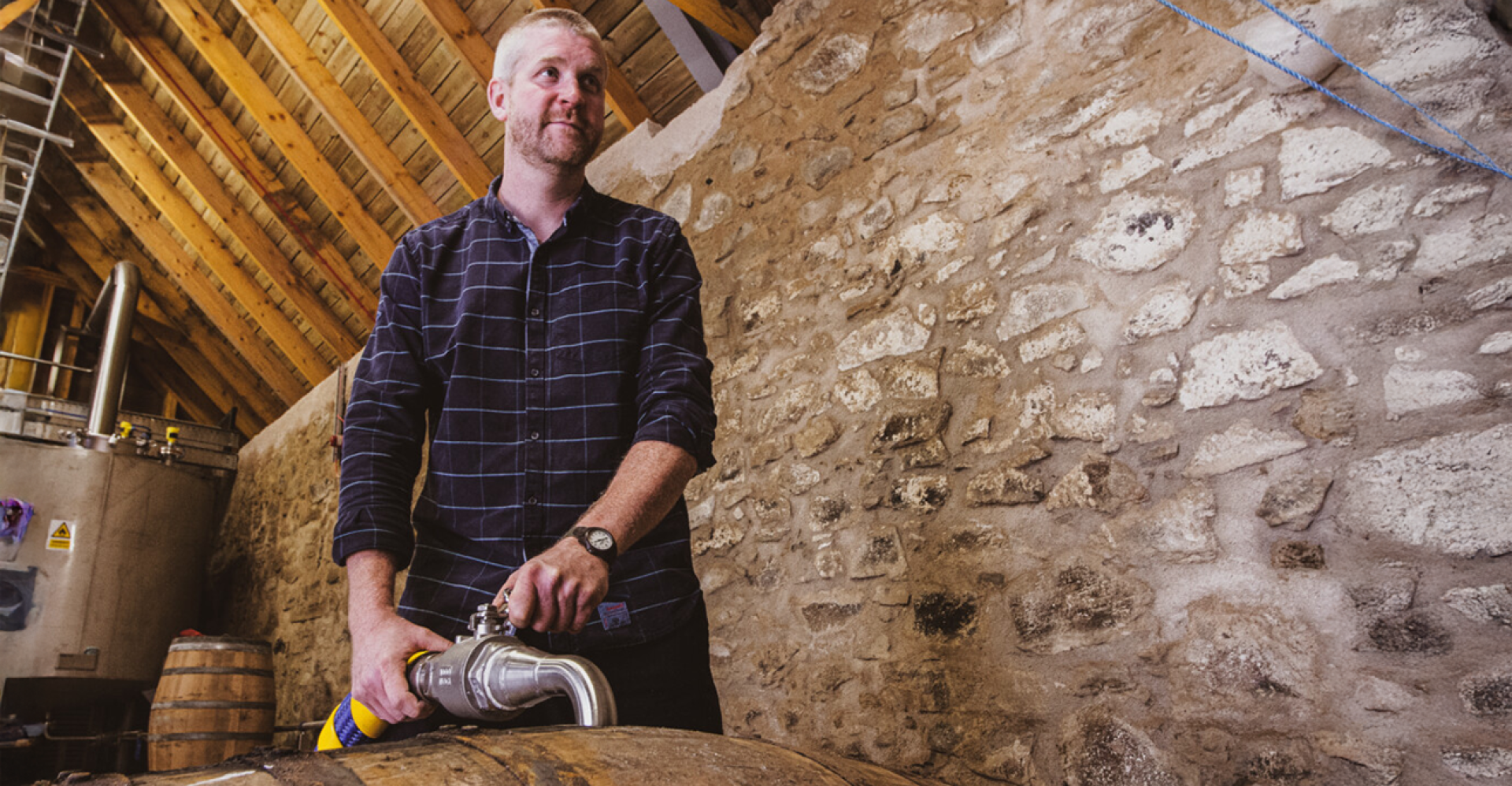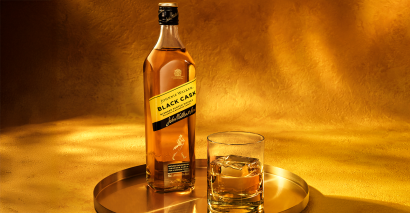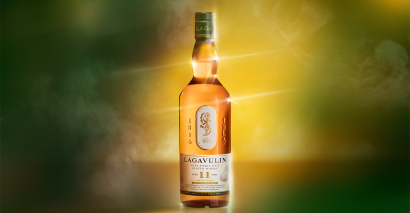
Distillery manager Gordon Wood fills a cask at Nc'nean, a distillery that offers a cask purchase program.
Scotch Whisky by the Cask
Believe it or not, you can buy your own barrel of scotch
August 1, 2025 –––––– Jonny McCormick
When Whisky Advocate did a cover story on scotch whisky cask ownership back in 2008, we quickly learned that some scotch producers hadn’t considered how their U.S. customers would get their whisky home once it matured. Nowadays, distilleries will simply tell you that it’s your responsibility to arrange shipment. The problem is that distilleries can’t bottle and ship the contents of a single cask to private individuals in the U.S. unless it gets sold through the three-tier system (producer-distributor-retailer). But that doesn’t mean you’re completely out of options.
Although distilleries including Springbank, Macallan, Bruichladdich, and Glengoyne previously offered cask-buying programs, today most established scotch makers stay away from cask sales. The practice is now largely led by cash-stretched start-ups, where the quality of the whisky is still largely unproven, as distilleries in their first decade of operation might not have aged stocks available. So whisky fans in those cases won’t be able to “try before they buy” with samplings from the distiller.
As we reported in our cover story on single barrel American whiskeys this past spring, in the U.S. you’re buying a barrel of mature spirit to bottle rather than becoming a cask owner per se, whereas scotch whisky distilleries sell new-make fillings, so you purchase the whisky before it has been aged. To avoid direct competition with their own brands, scotch cask ownership programs often prohibit cask owners from using the distillery’s trademarks, branding, logos, and distinctive bottle shapes, which is quite different from the U.S. barrel pick programs, though scotch cask buyers usually have some design input into a generic label. While barrel selection in the U.S. is a two-stage process—the distiller pre-selects some barrels and the buyer chooses one—in Scotland you have control from the start. For example, you can choose whether you’d like an unpeated or peated malt, or whether to fill a bourbon or sherry cask, as you’ll be paying up front for 10 years of warehousing in most cases.
U.S. private barrel programs involve one-time costs, whereas the advertised price for scotch whisky cask ownership programs is only the initial cost of the spirit, warehousing, and insurance. To avoid sticker shock when you bottle your cask, remember that you will be charged for duty, value-added tax (VAT), bottling, shipping, labeling, design, and delivery, which can be a much greater sum than your original outlay (see What You Might Pay).
The exceptions to the rule are Glendronach, Benriach, and Glenglassaugh—Brown-Forman’s scotch whisky distilleries, which are bucking the trend by making a few casks available each year in their U.S.-style private barrel selection program. Large whisky companies also operate private client programs where distillery representatives manage relationships with their wealthiest clients to assist them in accessing rare bottles, exclusive experiences, and their own personal casks of whisky. The Diageo Casks of Distinction program is one such example, and there was a similar private client program from LVMH (owners of Glenmorangie and Ardbeg) that handled the direct sale of a cask of Ardbeg 1975 to a collector in Asia for $19 million last year.
Our How-To guide shows you every step of the process, including how you can become a cask owner. One quick word of warning: The specter of unscrupulous third-party cask brokers offering big returns in a bid to lure investors into cask investment scams remains a prevalent problem online. We recommend only dealing with distilleries directly, though new fillings and direct cask sales do appear at auction and on NFT platforms like Metacask.

How to Become a Scotch Whisky Cask Owner
STEP 1: Choose a Cask Program
As most options in scotch whisky are from new distilleries, the likelihood is you will be buying a cask before you’ve had a chance to try the whisky. Distilleries with cask ownership programs set aside a number of casks each year, and they often sell out quickly.
STEP 2: Decide on your Spirit and Cask Type
Choose from unpeated or peated spirit, and some distilleries also offer a grain spirit option. Bourbon and sherry casks are usually available, but some offer greater selections, including a variety of wine and rum casks for maturing your spirit. The distillery’s reputation, spirit type, cask type, and volume will dictate the price, but expect to pay more for peated spirit and sherry casks. Small casks such as octaves are less expensive, for the simple reason that they involve smaller volumes, but these are not a standard use cask size in the industry for good reason; the spirit will mature very quickly and the wood influence can overpower the whisky.
STEP 3: Read the Small Print
Cask offers vary between distilleries, so read the terms and conditions carefully. You are buying the liquid inside the cask, but you won’t actually own the cask itself. Note details such as the length of maturation included in the price, whether you are entering an agreement that means you can only use the distillery’s bottling facilities, what insurance is included, restrictions on ownership transfer, and trademark use.
STEP 4: Buy the Cask
Pay the distillery for your cask, but remember there will be more to pay when your whisky has matured (see What You Might Pay). Congratulations—you are now a cask owner!
STEP 5: Wait, but use the Time Wisely
You may have a decade to wait until your whisky is ready, but that will give you ample time to visit the distillery and take advantage of any cask owner perks like exclusive bottlings and discounts. Some programs let you visit your cask by arrangement. Many distilleries allow you to request cask samples so you can follow the maturation progress— but make sure you keep your contact details up to date with the distillery.
What You Might Pay
This is an example of a scotch whisky cask that initially cost £5,000, then left to mature for 10 years. U.S. consumers will be charged in GBP by the distilleries but currency rates can fluctuate over a decade, so only at the point when there is a final price for the bottled goods is the sum converted to U.S. dollars. For clarity, we’ve converted the final sum only, but obviously, the exchange rates will not be the same when the cask is purchased and when it is bottled 10 years later.
• Initial Cask Purchase of a 200-liter bourbon barrel filled at 63.5% ABV costs £5,000
• 20% VAT payable on the cask purchase price when the cask is removed from bond once mature: £1,000
• Assume evaporation at 2% per year and a drop in ABV over time
• 163 liters remain after 10 years of aging at 60% ABV, which is enough for 233 bottles at cask strength.
• Duty is charged at £28.74 per liter of pure alcohol. The liters of pure alcohol are calculated by multiplying the volume by the ABV
• 163 liters x 0.6 = 97.8 liters. • 97.8 x £28.74 = £2,811
• 20% VAT is payable on the duty: £562 • Bottles, corks, closures, labels, packing costs (assume £10 per bottle): £2,330
• Total (before shipping costs if entering the three-tier system): £11,703
• Convert total to U.S. dollars (£1=$1.22): $14,226
• Price per bottle: $61
Select Scotch Distilleries With Cask Offerings
Ardnamurchan • Annandale • Ardross • Borders • BrewDog • Falkirk • GlenWyvis • Inchdairnie • Isle of Raasay • Lindores Abbey • Lochranza • Nc'nean • Stirling • Toulvaddie
Your Cask Is Ready: Now What?
OPTION 1: Bottle It
Scotch whisky must be bottled in Scotland. The distillery can help you to design a label compliant with the Scotch Whisky Regulations. Bottling can take 2-6 months to complete, and you will be charged for the cost of the bottles, closures, labels, cartons, labor, and shipping at prevailing rates. Some programs include this in the initial costs, but most do not. Importing bottled spirits from Scotland to the U.S. is only possible if you have the necessary alcohol importation permits. You’ll also need to pay for duty, and payments to handling agents, and federal, state, and local taxes depending on your location. The spirit must go through the three-tier system of importers, distributors, and retailers. You won’t be able to sell the whisky commercially if you’re not licensed in the trade, but if you are licensed, you’ll need to inform the UK tax authorities that the cask is for commercial purposes. You’ll also need to seek label approval from the Tax and Trade Bureau.
OPTION 2: Sell It Back
Some distilleries offer buy-back options where they reacquire your cask. This is the easiest option for some cask owners, but without competition from other buyers, the price is likely to be the lowest offer on the table. And after all this, it would be a shame to part with it!
OPTION 3: Auction It
Whisky auction houses and cask-only auction specialists will put your cask under the hammer, and some, such as The Grand Whisky Auction, have a dedicated cask manager to assist cask owners with the process. Choose your auctioneer based on their previous results in cask sales, and understand what commission they charge for their services. Ensure your legal ownership documents are ready, so you can complete the transfer of ownership as soon as the sale is over. Good luck with the auction! With the right contacts and resources, it would be technically feasible to pay for your cask to be bottled in Scotland and then consign a few dozen bottles to auction each month. If you have a friend living in a state where the auction house can legally send whisky to them through a courier, it would be possible for your acquaintance to bid on the bottles from your cask so they can ultimately end up in your home. Bidding on your own lots is not permitted.
OPTION 4: Use a Broker
Instruct a broker to sell your cask, and pay commission if the sale is successful.
OPTION 5: Keep Maturing It
Distilleries charge annual storage fees on casks kept beyond the original terms of the agreement, and not every distillery will accommodate this. You can continue to request samples, but you will likely need to pay for this service as well. You can arrange to move your cask to another bonded warehouse in Scotland, if necessary. Remember, whisky does not go bad once it’s bottled, but continued maturation in a cask is a different story, as it can become woody, leak, and will evaporate. If the ABV falls below 40%, then you no longer own a scotch whisky—the minimum required is 40%— and it’s game over. Once you’re ready to move your cask, you’ll need to do the regauging again.





